At the Frontlines of the Climate Crisis with Takanashi Sara
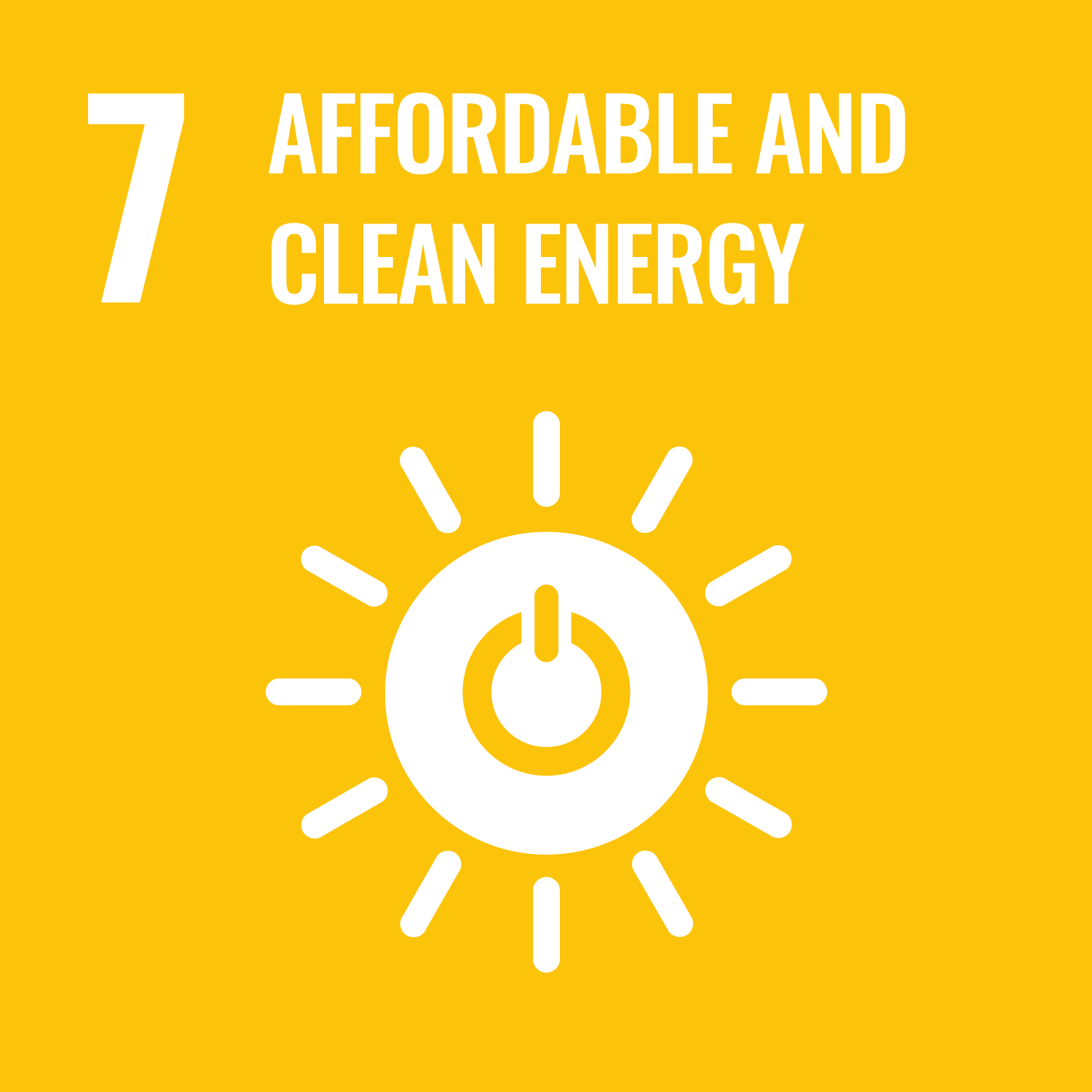


2024.11.11
The Republic of Palau is known as a "Pristine Paradise" with its abundant sunshine and clear blue ocean, but the country is also being significantly impacted by climate change. Japanese ski jumper Takanashi Sara visited Palau to explore the sites where climate change initiatives are underway and connect with the people involved. Her visit sheds light on Palau’s efforts to combat climate change.
Explore this topic through the article and video.
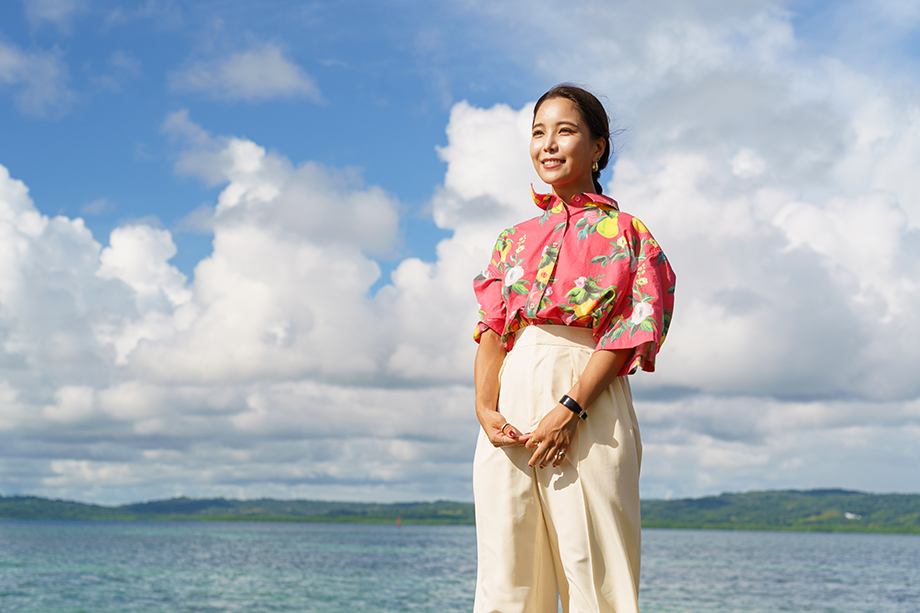
Takanashi Sara, Ski Jumper
Takanashi, born in 1996, began ski jumping in the second grade. She won a bronze medal at the 2018 PyeongChang Winter Olympics and remains active on the global stage, with a record 63 victories in the International Ski Federation (FIS) World Cup. This is the most of any athlete of any gender. As she travels the world, she has become increasingly concerned about climate change, particularly its impact on mountain snow. In 2023, she launched the "JUMP for The Earth PROJECT," and is actively engaged in environmental protection initiatives.
Palau is an island nation located about 2,000 kilometers south of Okinawa, Japan, and is made up of more than 300 islands. It boasts stunning natural landscapes of rich ecosystems, including coral reefs and mangroves. The Rock Islands and Southern Lagoon, which consist of hundreds of islands, have also been designated as a UNESCO World Heritage Site.
Takanashi was deeply impressed upon her first arrival. "The clarity of the sea seen from up close is amazing,” she said. “The natural forests are lush, creating a vibrant atmosphere where dogs and other animals seem to live freely with people."
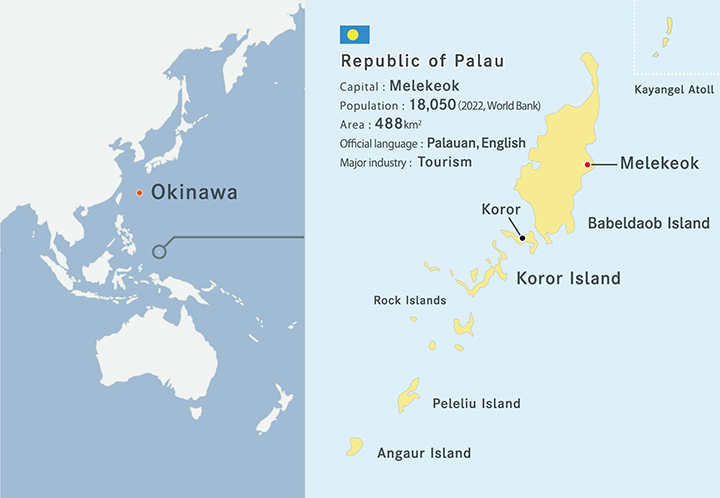
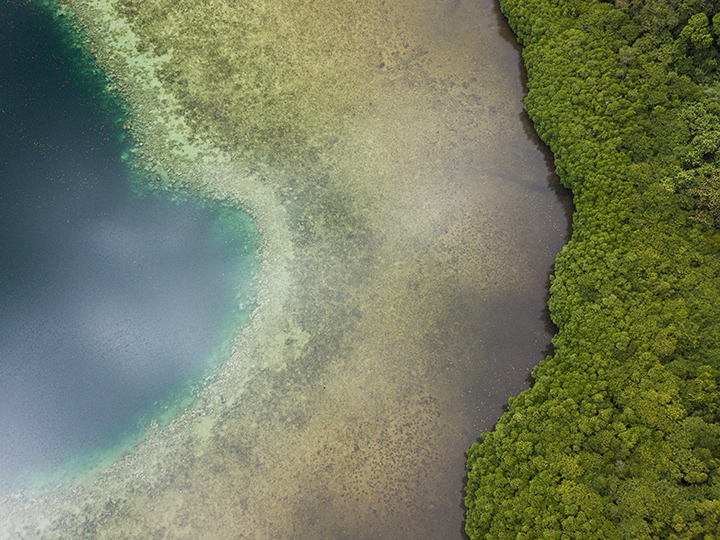
Where the sea meets the mangrove forests, seaweed and coral reefs create a beautiful gradient of color.
Caryn Lkong Koshiba, the interim CEO of the Palau International Coral Reef Center, shared the significance of Palau’s ecosystem with Takanashi. "There are a remarkable variety of coral species in Palau, with around 400 species of hard corals and about 300 species of soft corals,” she said. “Thousands of marine creatures, including fish and seaweed, thrive here."
In recent years, Palau has experienced negative impacts from climate change, including coral bleaching caused by rising sea temperatures, and environmental degradation from tourism and commercial development. The Palau International Coral Reef Center was established in 2001 with the cooperation of Japan, following a massive coral bleaching event in 1998. It serves as a research hub for coral reefs. The center conducts monitoring and ecological studies of corals that are more resilient to bleaching—even in higher sea temperatures—to preserve the coral reef ecosystem.
Koshiba emphasized the importance of conserving the entire coastal ecosystem, from corals to mangroves. "Corals and mangroves act as breakwaters and seawalls, protecting us from high waves and tsunamis,” she said. “The roots of mangroves shield corals from sedimentation caused by soil erosion, while their decomposing leaves provide food for crabs and other small creatures that live in the mangroves. The people of Palau rely on the seafood that grows there for our sustenance."
Takanashi contemplated the significance of the coastal ecosystem and the benefits it provides to the people of Palau. "I realized that it's not just corals that matter; everything, including mangroves and the fish that inhabit them, is vital to the ecosystem,” she said. “If one element is missing, it affects everything."
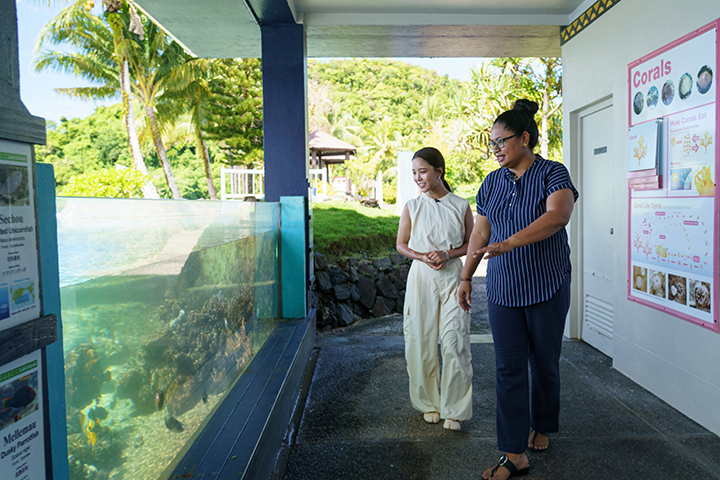
Takanashi toured the Palau International Coral Reef Center, where she received explanations from Koshiba.
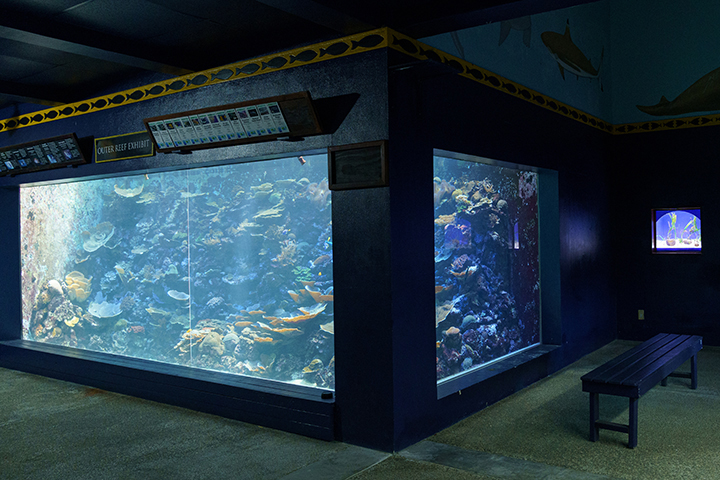
The center includes an aquarium on site.
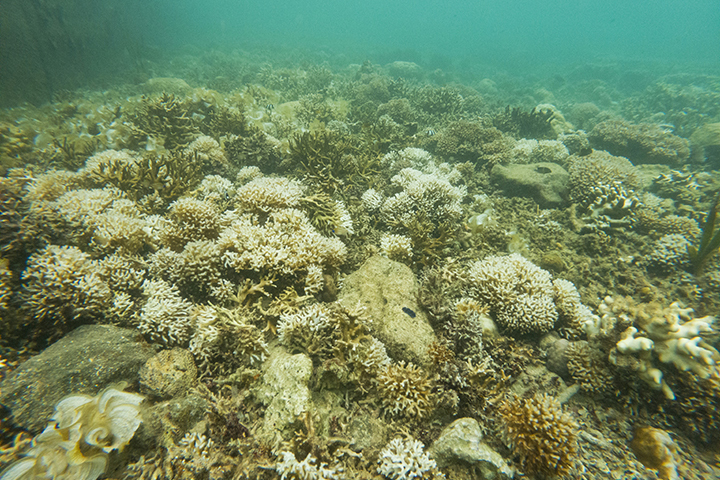
Corals suffering from bleaching. If this condition persists for too long, they will die.
Takanashi participated in an eco-tour by kayak through the mangrove forests to experience the importance of this ecosystem firsthand. This eco-tour is being developed in Ngiwal State, on the eastern part of Babelaob Island, with cooperation from JICA. JICA is helping build a monitoring system for the mangrove forests and is conducting educational activities to raise awareness of their importance. The eco-tour is part of this initiative.
"The eco-tour and monitoring activities are being conducted by local rangers,” said Itagaki Kanako, a JICA expert. “The state has a population of around 200, and nearly 20 people have already been trained as eco-tour guides, with plans to increase that number.”
Takanashi asked Itagaki what kinds of surveys were being conducted by the rangers. "They assess the condition of the mangroves within the protected area, conducting surveys on the species of mangroves,” Itagaki said. “They also examine fallen trees, and measure trunk diameters to ensure a healthy ecosystem."
Itagaki said that mangroves store more than three times the carbon of tropical rainforests, which makes them a crucial ecosystem for climate change mitigation. “We are also collaborating with the Palau International Coral Reef Center to engage children in activities that teach them the fascinating and crucial role of the mangrove ecosystem."
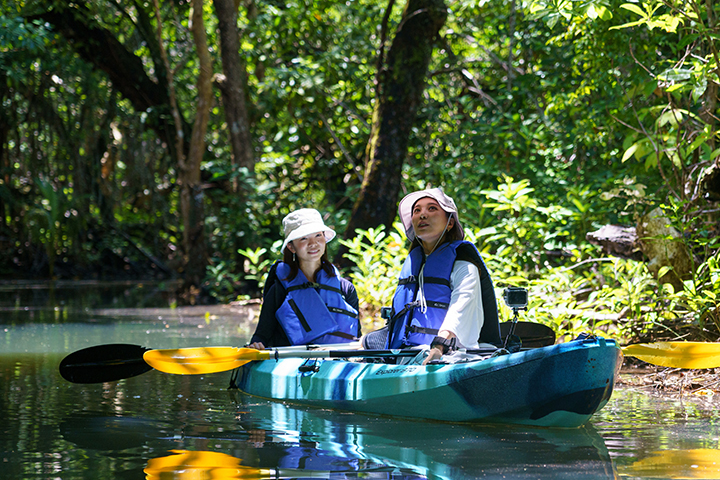
Takanashi on her first kayak adventure with JICA’s Itagaki. "I feel so relaxed just being in the mangrove forest," she said.
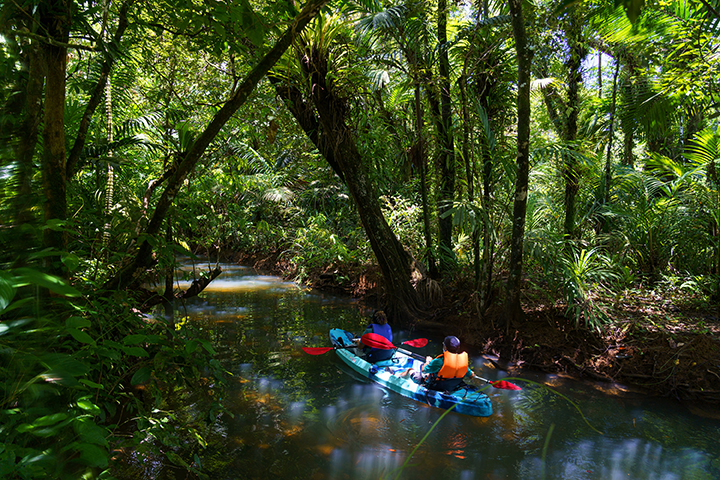
Ranger monitoring. More young rangers are being taught about their land, nature, and mangroves, fostering a sense of attachment and a desire to "protect" them.
Having learned about the local efforts to adapt to the impacts of climate change, Takanashi also sought to learn about the initiatives for "decarbonization" in an interview with President of Palau Surangel S. Whipps Jr.
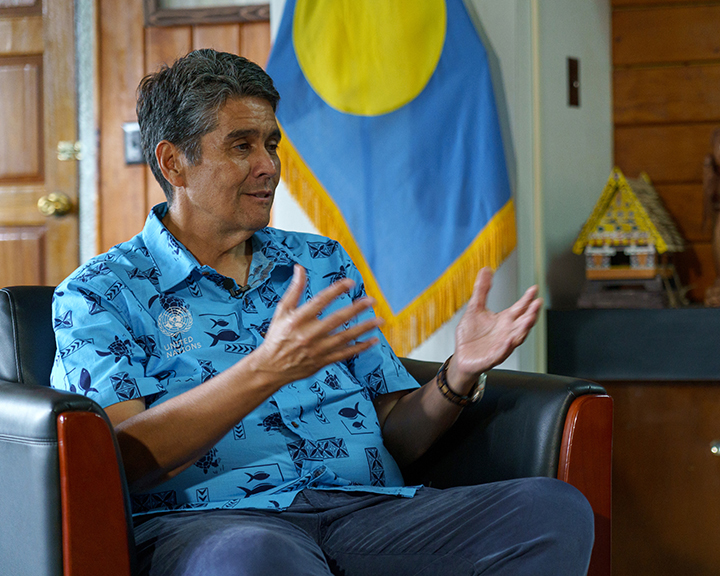
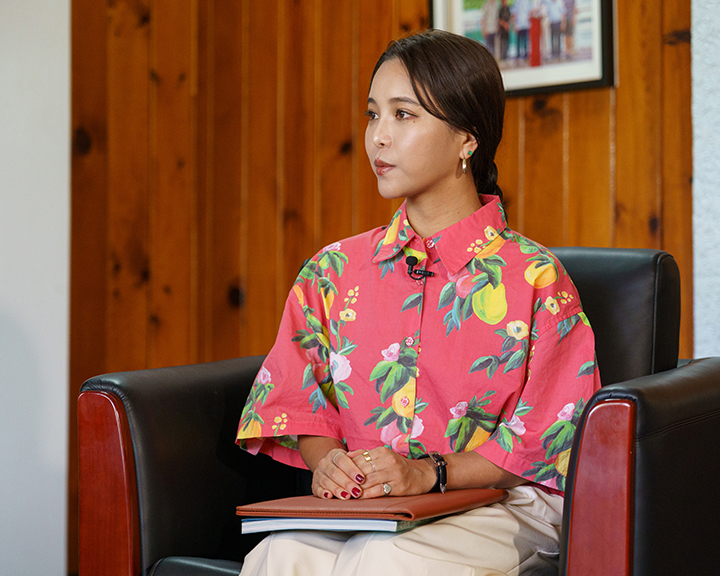
Takanashi: As a Pacific island nation, Palau is particularly vulnerable to the impacts of climate change. What are the specific effects that are being felt?
President Whipps: Direct impacts include storms and storm surges. Schools and homes have been destroyed by the type of large typhoons that did not occur in the past, and the entire eastern coast of Palau has suffered from storm surges. Rising sea levels have also led to saltwater intrusion into the wetlands where taro is cultivated. Rising sea temperatures have led to a decrease in the number of jellyfish in Jellyfish Lake, a popular spot where you can swim with them. Tourism, our main industry, and taro, our staple food, are vital to our economy. Each time we have to rebuild after storms or surges, our lives regress.
Takanashi: That's a difficult thing to hear. Could you explain why decarbonization is particularly important for Palau?
President Whipps: I have attended several COPs (Conferences of the Parties to the UN Framework Convention on Climate Change). At the first COP I attended, I stated, "You might as well bomb our islands instead of making us suffer through a slow and fateful demise." The effects of climate change are similar to a slow death. To reduce carbon dioxide emissions, everyone must make decisions and take actions, whether by using renewable energy or opting for local solutions that do not rely on transportation energy.
Takanashi: How is Japan’s cooperation assisting Palau in its climate change efforts?
President Whipps: Palau aims to achieve a 100 percent renewable energy ratio by 2032. Currently, we are investigating Ocean Thermal Energy Conversion (OTEC), with the cooperation of JICA. This technology has the potential to provide a clean and stable energy source that will help with decarbonization. From the OTEC project in Kumejima, Okinawa, we learned that it can lead not only to electricity generation but also to the development of industries using deep seawater. I hope we can implement this in Palau and showcase our decarbonization efforts to the world. We are also testing a bus system to reduce people's reliance on cars and lower carbon dioxide emissions. We hope to advance to the next stage by utilizing electric (EV) or hydrogen buses.
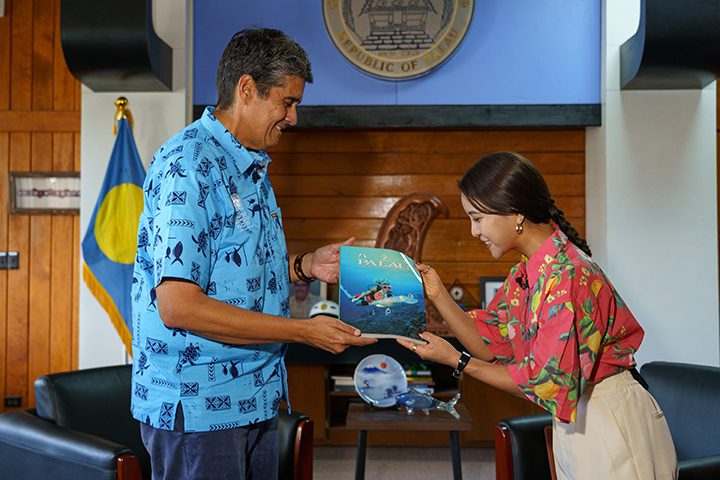
Palauan President Whipps presented Takanashi with a book introducing Palau.
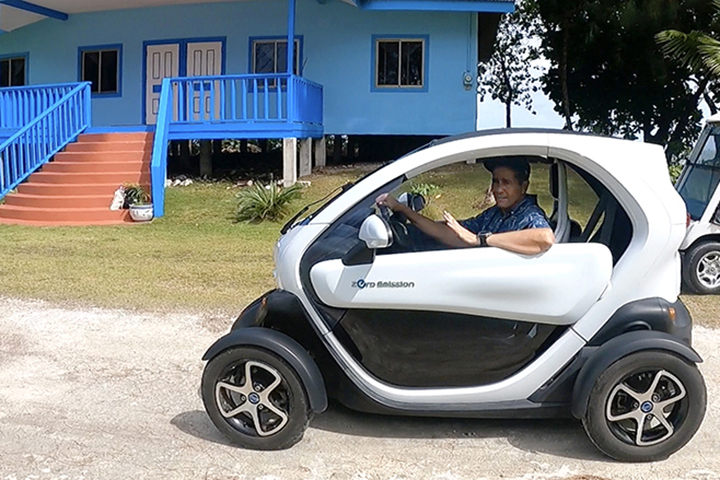
The "Himeshima Model," which utilizes EV vehicles equipped with solar charging systems for tourism, is also being considered for implementation in Palau. This initiative, carried out by the Japanese startup T-PLAN in Himeshima Village, Oita Prefecture, held a test ride event in Palau in April 2023. The photo shows the president taking a test drive.
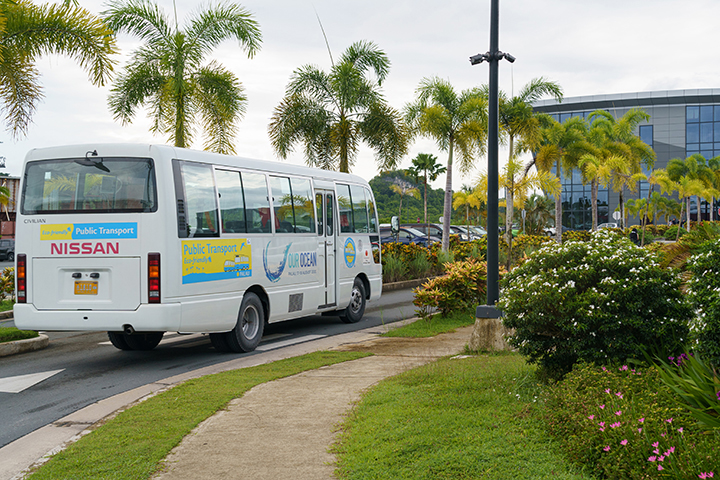
Palau is a car-dependent society where the primary means of transportation is private cars. A bus line is currently being tested as part of an effort to develop an environmentally friendly public transportation system in cooperation with JICA.

Takanashi rode on the bus line. She often uses buses in her personal life.
After speaking with various people involved in climate change measures in Palau, Takanashi
said she was surprised to see the site of JICA’s cooperation throughout Palau. "I view climate change as a serious issue and have become increasingly alarmed by the cancellation of ski jumping competitions due to a lack of snow, as well as the rising use of artificial snow,” she said. “My visit to Palau made me realize that I need to expand my focus beyond just snow and mountains; I need to look at the world more broadly. Our lives are protected by nature, including both the sea and the mountains. Each one of us needs to engage with the issue of climate change."
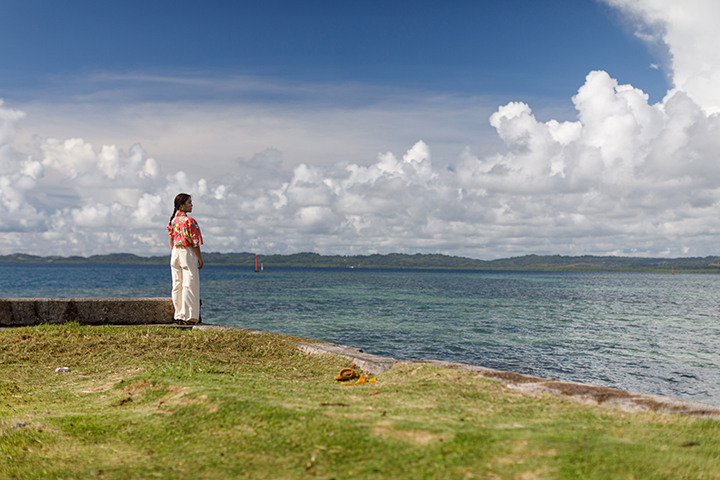
scroll